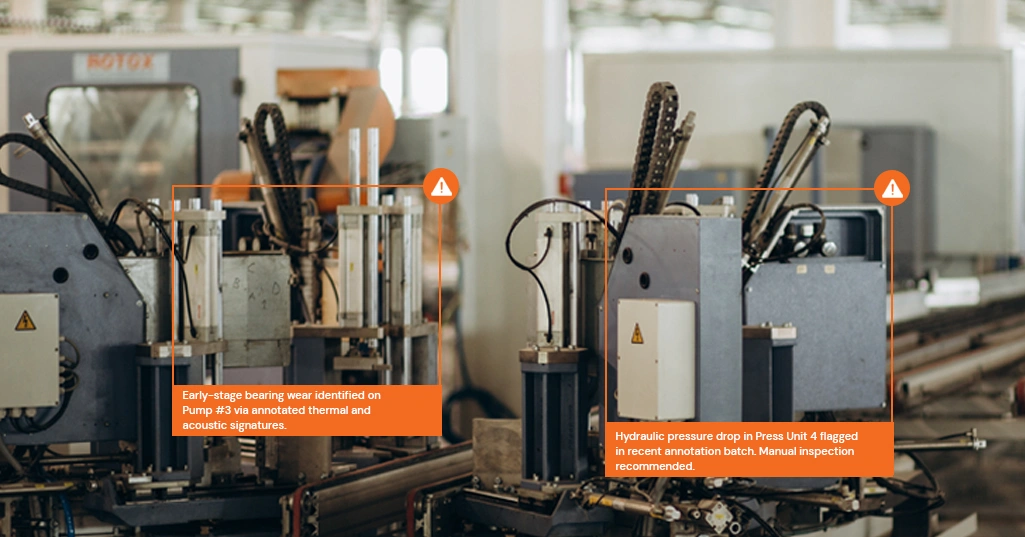
For large companies investing in Artificial Intelligence, here’s something you can’t afford to overlook: 80% of AI-ML projects fail, and a significant reason for this failure is poor data annotation. So, even with the most advanced technology, your AI models won’t perform effectively without properly labeled data.
But what is data annotation? At its core, data annotation refers to the process of tagging or labeling raw data-like images, text, audio, and video-for better understanding by machine learning models. Artificial intelligence systems can not relate to or learn anything in a meaningful manner from the data devoid of these labels.
Any big enterprise planning to invest in AI follows one data annotation step, wherein it changes raw, unstructured data to a structured resource for model training. Thus, the quality and accuracy of this annotation will impact the performance of AI applications, specifically prediction improvement through better decision-making processes. Let us understand the role of the right data annotations for enterprises:
The Critical Role of Data Annotation for Enterprises
When it comes to AI, data is everything! But raw data alone isn’t enough. For large enterprises, using unstructured, raw data (like text, images, or audio) can lead to chaos. Think of data annotation as giving your AI system a map—without it, your models are just guessing. This means higher chances of errors, inefficiency, and missed opportunities. For your AI models to be truly effective, that data needs to be properly labeled. This is where data annotation comes in! Here are some statistics that prove why data annotation is crucial for your business:
- According to McKinsey, 70% of AI model performance comes down to the quality of the data used to train it. Without well-annotated data, your AI models will struggle to deliver accurate predictions and insights. Poor data means poor results—simple as that.
- Companies that focus on quality data annotation can reduce time-to-market by upto 30%, according to Accenture. With a proper data annotation, your models can be trained faster and more accurately.
Large enterprises have a high amount of unstructured data including emails, images, videos, and voice recordings. It is considered to make up about 80% of the total enterprise data. Without data labelling, this massive volume of information will remain untapped and unused.
Data annotation will bridge the gap by tagging, classifying, and structuring this raw data. This will help in transforming it into actionable insights for your business.
So, data annotation is not just a technical step- it’s a critical business task. Specifically for larger enterprises! Ignoring well-labelled data is not an option. Implementing precise data annotation will also help in utilizing the full potential of your AI investments.
The Need for Data Annotation Automation Engineers
As data keeps growing at a crazy pace, manual labeling can quickly become a major bottleneck. That’s where a data annotation automation engineer comes in—they’re the pros who create systems that make the labeling process faster and more efficient, all without losing accuracy.
Data annotation automation engineers use smart tools like active learning, rule-based annotation, and AI-assisted labeling to speed up the entire process. Their work is essential for keeping data accurate and consistent at scale. This allows businesses to produce huge amounts of training data in less time, while still maintaining top-notch quality.
Now, partnering with a trusted data annotation service provider takes this efficiency to the next level. It guarantees both speed and accuracy. Here are the key features to look for when selecting a suitable data annotation services provider.
Choosing the Right Data Annotation Services
It is crucial to make sure that your data annotation provider not just meets your technical requirements but also understands the implications of your specific industry. Following are the key factors that can help you to navigate better:
Domain Expertise
Different industries have distinct data requirements. Whether you’re working in healthcare, finance, autonomous driving, or retail, the way data is annotated can differ significantly. Having a data annotation service provider that understands your industry ensures that the annotations are relevant and tailored to your needs.
- Ensure the data annotation service provider has experience working with data from your domain, as this can directly impact the relevance and accuracy of the annotations.
- Depending on the industry, you may need specific types of annotations like image segmentation (e.g., for autonomous driving) or medical coding (e.g., for healthcare). The provider should be proficient in these specialized techniques.
- Some industries, like healthcare and finance, have strict regulations such as HIPAA Security Rule or GDPR. A data annotation service provider with domain expertise will be familiar with these standards, ensuring your data is handled correctly.
Security
Data privacy and security are predominant when dealing with sensitive information. A simple data breach can give rise to severe legal and financial consequences. Therefore, choosing a data annotation service provider who prioritizes security is critical.
- The data annotation service provider should encode your data both during transit and at rest. This protects your data from unauthorized access while being transferred and stored.
- Make sure that access to your data is restricted to authorized personnel only. Look for data annotation service providers that implement role-based access control and multi-factor authentication.
- The provider should have clear confidentiality agreements in place. Protect your intellectual property and ensure that your data is not shared with unauthorized parties.
- It’s beneficial to choose a provider that has relevant certifications like ISO/IEC 27001 (for information security management systems) or other industry-specific certifications.
Quality Control
The accuracy and consistency of your annotated data directly impact the performance of your AI or machine learning models. If your data annotations are incorrect or inconsistent, your model’s results will be unreliable.
- A reputable provider should have a robust quality control system in place. This could include multiple rounds of checks by different annotators and a final review by experts to ensure high accuracy.
- The provider should be able to demonstrate a clear system of measuring quality. This might include metrics like inter-annotator agreement (IAA), accuracy rates, or even direct feedback loops to improve the annotation process over time.
- The ability to create custom guidelines for annotations ensures that the data annotation process aligns with your specific requirements. AI enhances quality control when the annotators are clear on the desired output.
- A transparent audit trail allows you to track the progress and quality of annotations at every stage of the process, ensuring that any discrepancies can be quickly identified and addressed.
How Data Annotation Directly Drives Innovation: Use Cases
By labeling and tagging data in a way that machines can understand, data annotation automation engineer help AI systems “learn” from it and make better decisions. Let’s look at some use cases to see how data annotation directly drives innovation and enhances AI applications:
Real-Time Pricing & Recommendations through Data Labeling
Using retail IT solutions, annotated customer data helps businesses recommend products based on your preferences and purchase history. It also allows for dynamic pricing, adjusting prices in real-time based on demand and stock levels, making the shopping experience smoother and more personalized.
AI Healthcare Solutions via Annotated Imaging
Custom healthcare software development services enable solutions that process labeled medical images like X-rays and MRIs, allowing AI to detect conditions such as tumors or fractures with greater speed and precision. These tailored solutions also support continuous patient monitoring, helping healthcare providers intervene early and deliver better outcomes before issues become critical.
Fraud Detection with Tagged Transaction Data
Tagged transaction data enables AI to identify fraudulent activity by learning from past patterns. It also helps financial institutions assess risks, improving decisions on loans and investments while protecting against fraud.
Defect Detection through Annotated Visual Data
Annotated images of products and machinery help AI system spot defects and ensure quality control automatically. It also predicts when equipment might fail, allowing for timely maintenance and reducing unexpected downtime.
Make Data Annotation a Strategic Advantage with AQe Digital
At AQe Digital, we believe that data annotation is more than just a task—it’s a critical component of a successful AI strategy. When aligned with your business goals, it accelerates time-to-market and drives better AI outcomes. Here’s how we make data annotation work for you:
Aligning Data Annotation with Business KPIs | Building Reusable, High-Quality Annotated Datasets
We understand the urgency of getting your AI models up and running. By integrating precise data annotation into your development process, we help you bring solutions to market faster, giving you a competitive edge.
With a focus on your business KPIs—whether it’s boosting customer satisfaction, optimizing operations, or enhancing sales—AQe Digital ensures that our data annotation services supports your key objectives. This alignment ensures your AI models deliver real-world impact that matters to your bottom line.
As your business grows, your data needs evolve. AQe Digital offers scalable data annotation services that grow with you, ensuring long-term consistency and adaptability in your AI development.
The datasets we create aren’t just for today—they’re built with long-term value in mind. By focusing on creating high-quality, reusable datasets, we provide you with valuable resources that continue to support future AI projects and developments.
High-quality, consistent data is the foundation of any successful AI project. We ensure that the annotations we provide are accurate and well-structured, so your models perform at their best and continue to evolve effectively over time.
The annotated datasets we provide aren’t just one-off solutions—they’re an asset to your enterprise. By investing in high-quality data now, you’re setting up your AI strategy for long-term success, ensuring greater returns and lasting value.
Already Doing Data Annotation? We’ve Got Your Back!
You might already have some data annotation happening in-house, but maybe it’s not producing the results you’re hoping for. Perhaps you’re facing challenges with scale, accuracy, or speed. Or maybe the data is not aligned perfectly with your business objectives. That’s where we come in.
At AQe Digital, we bring expertise to the table. We understand the complications of data annotation across different industries, whether it’s healthcare, finance, retail, or manufacturing. With our team on your side, we can ensure that your annotated data is top-notch—helping your AI models learn faster and work smarter.
Not Doing Data Annotation Yet? Let’s Get You Started!
If you’re not yet using data annotation, you’re missing out on the potential of AI-driven solutions. Don’t worry—we’ll guide you through it. Whether it’s training a chatbot to understand your customers, helping your self-driving cars “see” the road, enhancing fraud detection in your finance system, or boosting sales with AI virtual assistants, annotated data is essential for your AI systems to function effectively.
Getting started with data annotation does not need to be complicated. At AQe Digital, we make it easy for businesses of all sizes to integrate high-quality data annotations into their AI-driven operational strategy.




